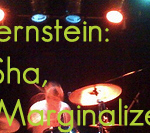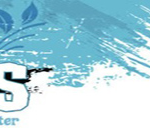Close to a year ago now, I went to a small club on a Thursday night to see the legendary Chicago instrumental group Del Rey. They put on a great show, but they were overshadowed by a trio I had never heard of before that night. That band was Electric Hawk. Their explosive sound, controlled dynamics, and unreal tightness literally had me jaw dropped. Their guitarist, Burns, had two massive pedalboards of boutique gear, and two half stacks for their set. I immediately knew that he was a man after my own heart. After I got home, I tried to dig up some info in hopes to explain how such an awesome band had escaped me. I found that he’s also the guitar player for the Chicago Blue Man Group! The BMG pit band has always intrigued me, so I thought it would be cool to pick his brain on how he got to where he is in the world of music!
What musical projects do you have currently, that you’d call active?
Electric Hawk, BMG, anything else?
I have a few others. A couple of them have ended up being really long-term collaborative projects with a couple of good friends.
One is called Mouth Captain. It grew out of sharing a rehearsal space and having long jams with my friend Eric back in around 2000. He has an incredible vintage drum collection that he augments with an old Deagan ElectraVibe, a pedal board, and a Boomerang. I play lap steel on 90% of that stuff. It’s really atmospheric and soundtrack-y. He now lives in Tokyo so we don’t get to play very often. We tracked some stuff last spring that I work on when I have some free time here and there.
Another project is called Snowman. It’s basically Mouth Captain without Eric. I end up playing more guitar than in Mouth Captain, but it’s the same vibe: very atmospheric, tons of effects, and mostly improvised. I do Snowman shows when my schedule allows.
The last project that I regularly work on is called Mersilene. It started in Boston back in around ’95 with my dearest and oldest friend, Hari. He sings, plays keys, and is arguably one of the greatest living drummers on the planet. The music generally starts from him and lies somewhere between Steely Dan and Hall & Oates.
Is guitar your primary instrument?
Yes.
Do you play any other instruments?
Lap steel, bass, saxophone, and a little keys when needed.
How long have you been playing guitar?
Around 26 years.
Did you take any lessons growing up? (guitar or other)
Yes. I had two guitar instructors: Richard Fortus (Guns & Roses, Thin Lizzy, etc) and Duke Michalak. He was Rich’s instructor that I started taking from when Rich’s band at that time (Pale Divine) got signed and left town. Duke is kind of the guitar guru of St.Louis. He’s incredible.
What impact did that have on you as a musician?
When I started with Duke, it pretty much opened up the fingerboard to me and helped me put names to what I had been doing by ear up to that point.
I read that you went to Berklee. What was your major?
Music Performance. I also did some Film Scoring.
How did you like that experience?
Do you feel you were properly educated to become a professional musician in the working world?
I loved it. For me, it was more about meeting people. Everyone I went to Berklee with is now working and known in the industry in NY and LA. Every gig I’ve ever had since I left Berklee has been from some connection I made there.
As far as knowledge and guitar playing, I had two teachers that I really got almost everything from. Almost everything else that I learned there was from jamming with other people. A lot of guys were already pro-level players when they got there. It was a humbling experience.
How did you get your gig with Blue Man Group?
Thru my friend Hari that I talked about earlier. He was the drummer in the Boston BMG show and got me an audition when BMG was putting their Vegas show together.
Can you I’ve a little insight to your role with the group, and what type of requirements do they have for their in house musicians?
Currently, I’m the full-time zither/guitar player in the Chicago show.
In Vegas, I started as the string trainer and played all of the string roles in that show (guitar, bass, zither, chapman stick). I became the resident musical director when the show moved to the Venetian Hotel. In 2006, I was the resident musical director and guitar player for BMG’s Megastar Tour. We traveled the world for two years. It was incredible.
They tend to look for guys with rock backgrounds, but team players who have good ears and can adapt quickly. All of BMG’s music is very ensemble based so there isn’t room for the gunslinger mentality there. You have to know that you are a small part of a much larger whole. Even though it’s a music based show, the music is there to support the Blue Men and you have to be comfortable with not being out front and getting all of the attention.
Do you still practice instruments, beyond when you’re writing for your band?
I go through phases of regimented practicing and not practicing, but I’m generally always playing or trying to learn something.
Do you still attempt to push forward by learning new instruments or applications?
Yes. I’m still compelled by music and am always looking to learn new things.
Do you have have a method for songwriting? How does it usually happen?
– Prefer bringing a skeleton to practice, or build as a collaboration
Generally, I or Graham(bass) will have a song that is almost completely done and we’ll refine the arrangement in rehearsal. That’s also the time that everyone will come up with new parts and sprinkle their own little pixie dust on it to make it their own.
Do you actively use your theory knowledge when composing tunes?
Not really. I just know what to call something if I have to explain it to someone else.
What is your electric guitar rig these days?
For Electric Hawk, my main amp is a ’67 Marshall 100 watt Super Trem that has been modded to be a Super Lead. I also have 50 and 100 watt Wizard Modern Classic heads that I love. I’ve been favoring the Wizard MC100 as of late. I own a ton of other amps, though.
For effects in EH, I have three boards that are generally always changing. I’m constantly buying, selling, and trading pedals. I have a ton of them.
How’s about acoustics?
I have a beautiful Lance McCollum guitar that is my favorite acoustic guitar that I’ve ever played. Sadly, he died a couple of years ago so it’s become really difficult and expensive to find them anymore. I also have a mid 80’s Guild that is my beater. It was my first real acoustic guitar. I love how it sounds. It records really well.
Does gear impact your songwriting / performing?
Yes. I don’t think that’s always the case, though. I write very often by singing ideas into my iPhone. However, playing a certain amp or guitar or combination of pedals that I really dig will always influence how a composition turns out and may have sparked the tune in the first place. Starting with a great guitar tone will always inspire something new for me.
Any advice for students who are trying to find success in the music industry?
-Practice. All the time. Sometimes I find that there is this attitude out there that practicing is bad somehow. That practicing and commanding the basics of being a competent musician is somehow a negative thing and that it takes away from some bullshit punk rock cred or whatever. It blows my mind when I hear this. Unless you are one of the luckiest people to have ever walked the face of the earth, NOTHING is going to bring you success and the ability to support yourself as a musician more than hard work and consistent practice. Also, just being cool and conducting yourself in a professional manner is very important.
Sid Vicious: A) was lucky, B) was a shitty bass player, and C) is dead.
Get over yourself: buy a metronome and get to work.
What are your thoughts on the state of the music industry, and what the future holds?
I think the state of the music industry holds a lot of promise and is very exciting. It’s in such a state of flux that I think with a few creative ideas, you can basically do whatever you want. The rulebook has been tossed out and it’s kind of like the wild west right now. I think the next couple of years are going to prove to be really interesting and positive for artists.
Any other misc things to add?
Listen to and absorb as much and as many varied types of music as you can. Expanding your ears and exposing yourself to new music that you wouldn’t typically hear is very important. Also, never forget that life experience plays into your music in the same way that practice does. Sitting by yourself and playing 8 hours a day is great, but don’t cripple your social skills because of practice. You have to interact with people if you are going to choose music as a way of life. Know how to talk to people. Life experience is going to give your music more depth and give you a wider range of inspiration to borrow from. Oh….and buy the debut CD or vinyl from Electric Hawk ☺



